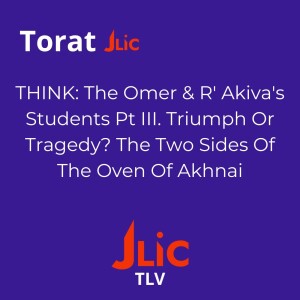

THINK: The Omer & R’Akiva’s Students Pt III. Triumph or Tragedy? The Two Sides Of The Oven Of Akhnai
Is the story of the oven of Akhnai the greatest triumph or a terrible tragedy? Last week we read the first half of the story and it's trumphal line of lo bashamayim hi - the Torah is not in heaven and its depiction of God laughing. This week we read the second half of the story which pushes in a very different direction.
The text of the Akhnai story is here (reading the story, especially the second half, is recommended to understand the class) and the other sources discussed in the story are here
---
A recap of the series thus far:
Rabbi Akiva’s students died because they couldn’t honour one another. We use this text to ask two questions:
-
-
How should Torah be learnt?
-
How should we treat one another?
-
Until now our learning has focused upon the first question - how should Torah be learnt?
In our first class, with Judaism at a crossroads after the destruction of the Temple, we saw two approaches to this question:
-
Rabbi Eliezer: retaining the traditions and the mesora
-
Rabbi Yehoshua / Rabbi Akiva: chiddush and debate
We asked, is this simply a question of educational methodology or is it even one of theology?
Last week, in part II, we saw the clash of these approaches in that most famous of stories, the oven of akhnai.
We saw Rabbi Eliezer - who a heavenly voice says is always correct - have his arguments rejected by Rabbi Yehoshua and his colleagues. The rallying cry is lo bashamayim he - the Torah is not in heaven, it is down here on earth for us to decide, with human intelligence - aharei rabim l’hatot - to attempt to convince one another, and the law follows the majority.
If you finish reading the story where we did it appears as a great triumph. Hashem is laughing, the Torah is made eternal, nitzchuni banai - Talmud Torah is enthroned, Torah and the Jewish people can survive.
All of this is true but it is not the end of the story.
Because the story carries on and it pushes in what seems to be quite a different direction
More Episodes
All Episodes>>You may also like
Create Your Podcast In Minutes
- Full-featured podcast site
- Unlimited storage and bandwidth
- Comprehensive podcast stats
- Distribute to Apple Podcasts, Spotify, and more
- Make money with your podcast












